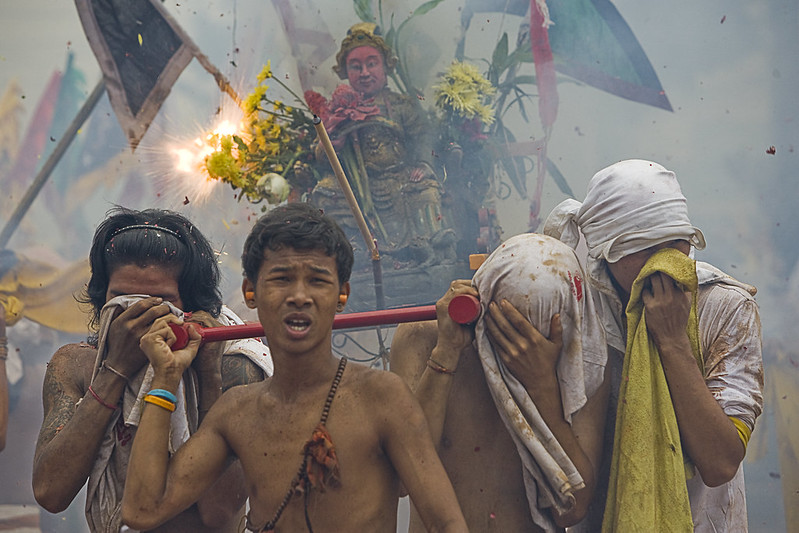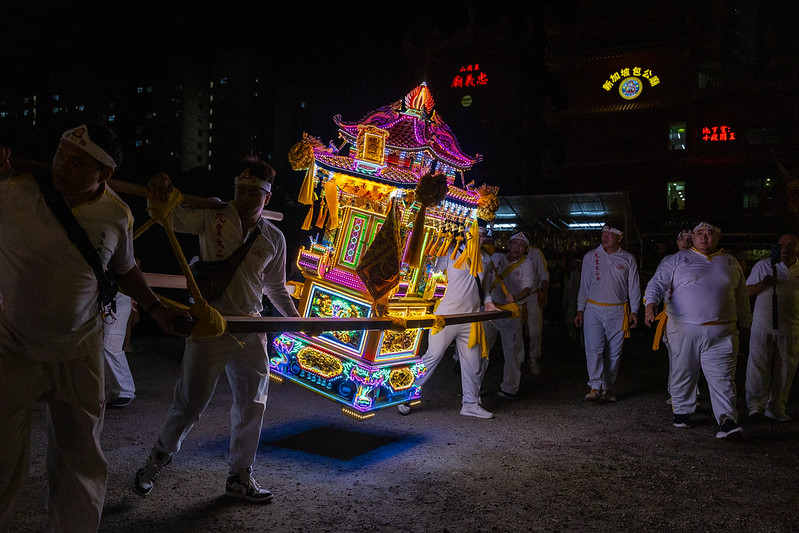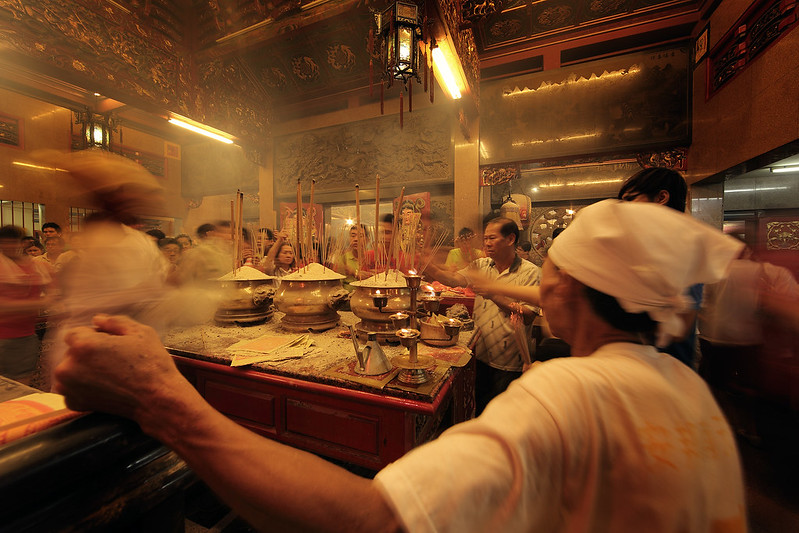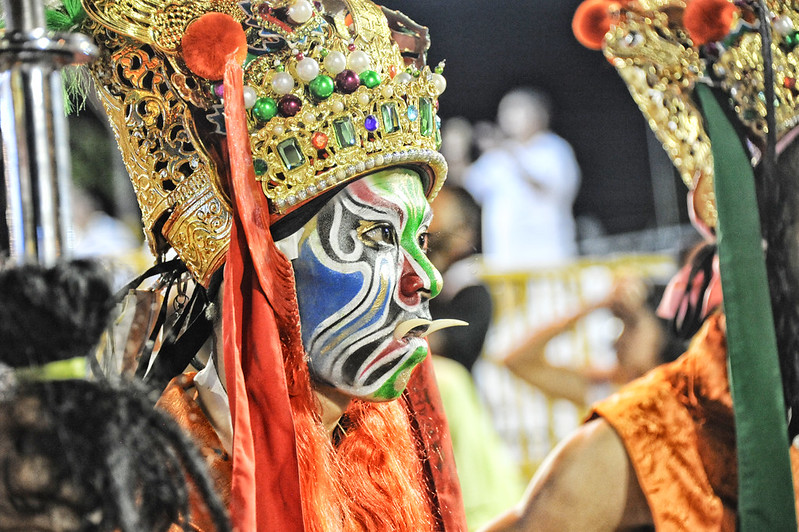Vegetarian Festival (Nine Emperor Gods Festival)
Fire, Faith, and Flavor
2025/09/28 - 2025/10/06
Every autumn, cities across Thailand are enveloped in the vibrant energy and aromas of the Vegetarian Festival (Nine Emperor Gods Festival). For nine days, places like Phuket and Bangkok are transformed into extraordinary spaces where prayer and plant-based culinary adventures intersect. Step onto the streets and you’ll find incense smoke curling in the air, while the scent of spices and herbs drifts from bustling food stalls. Immersed in this unique atmosphere, people cleanse their bodies and minds, looking forward to a fresh start. Whether you’re a foodie, a culture seeker, or a spiritual explorer, this festival promises an experience that stirs both the heart and all five senses.
The festival is held annually from late September to early October. The most spectacular celebrations take place in Phuket Old Town and Bangkok’s Chinatown, where both locals and travelers are drawn in by processions, rituals, and endless rows of vegetarian food stalls, experiencing a sense of purification and community togetherness.
Main Attractions
Processions and Ma Song (Spirit Medium) Rituals
The parades winding through Phuket’s streets are truly out of the ordinary. Devotees dressed in pure white or traditional Chinese costumes march with dignity to the sound of firecrackers. The most striking are the “Ma Song”—spirit mediums who, in a trance-like state, pierce their cheeks and bodies with swords or skewers and walk calmly, believed to absorb misfortune and purify the community. The clang of gongs and drums, the smoke and crackle of firecrackers, all blend into an atmosphere that is both chaotic and sacred.
Firewalking and Sacred Rituals
As night falls, temple courtyards fill with people eager to witness the firewalking ceremony. Devotees, barefoot, walk serenely across glowing embers, their figures illuminated by the flames in a mystical scene. The raising of the bamboo pole to invite the Nine Emperor Gods, firewalking, and bladed ladder climbing are all rituals where danger and faith intertwine—at the very heart of the festival, these events leave a powerful impression on all who watch.
Vegetarian Street Food Paradise
Street stalls overflow with inventive dishes: steaming bowls of yentafo (pink noodle soup with tofu and mushrooms), sweet mung bean or tofu-filled shaobing pastries, and kanom jeen (fermented rice noodles in coconut curry). The air is rich with the aroma of garlic, coconut milk, and fresh herbs, while the variety of textures—chewy, crispy, silky—makes eating your way through the festival an irresistible adventure.
Costumes and Decorations
The festival’s signature color is white, symbolizing purification and spiritual clarity. Devotees and participants wear white shirts and trousers, while Ma Song and parade leaders appear in vibrant Chinese robes, sashes, and headdresses of red and gold. Streets and temples are adorned with yellow and red triangular flags, lanterns, and banners. Incense drifts through the air, and altars decorated with fruit, flowers, and candles delight both the eyes and the soul.
Cultural and Historical Background
The origins of the Vegetarian Festival trace back to Phuket in 1825. At that time, a Chinese opera troupe performing in Kathu village fell seriously ill. In desperation, they honored the Nine Emperor Gods (Taoist deities) with strict vegetarianism and rituals, and miraculously, everyone recovered. Inspired by this event, villagers adopted the gods’ worship and vegetarian practices, and from the following year began conducting the rituals themselves. The custom spread throughout Phuket, and by the late 19th century, it was embraced not only by the Chinese community but also by local Thais, evolving into a major annual event for the region.
This festival is far more than a food event—it’s a fusion of traditional music, parades, vibrant decorations, and the ascetic rituals of Ma Song (spirit mediums). Centered around Chinese temples dedicated to the Nine Emperor Gods, the entire city is enveloped in an atmosphere of prayer and celebration for nine days each lunar year. Parades resound with drums and gongs, and the scents of incense and vegetarian cuisine fill the streets. These traditions have been passed down to the present day, making the festival one of Phuket’s largest cultural events, attracting visitors from across Thailand and around the world.
For many people, the Vegetarian Festival is a special nine-day period for abstaining from meat, alcohol, and stimulants, and for purifying both body and mind. Participants dress in white, maintain a vegetarian diet, and seek spiritual renewal through temple prayers, merit-making, and meals with family and friends. The Ma Song’s acts of self-mortification—piercing their cheeks and bodies, firewalking, climbing bladed ladders—are seen as acts of sacrifice, believed to absorb the community’s misfortune and purify it. Many bow in respect to these spirit mediums.
Beyond passing on faith and tradition to the next generation, the festival is a time to strengthen family and community bonds. Many people return home for the festival, sharing vegetarian meals and giving thanks to ancestors and deities. As a fusion of Thai and Chinese cultures, the event is a symbol of unity for people of diverse backgrounds, and today, tourists and participants from other cultures are warmly welcomed. The Vegetarian Festival is a cherished annual event in Thai society, embodying faith, healing, and connection.
Participant Voices
“I came to Phuket for the food, but what left the biggest impression was the energy. Amid the thunder of firecrackers and pounding drums, the Ma Song walked expressionless through the crowds, and the firewalking ceremony was truly intense—the heat, the chanting, the scent of incense lingered with me. The yentafo and coconut desserts I tried at the street stalls were outstanding. A local vendor explained the meaning of the yellow flags and the importance of purification during the festival, and I was moved by the depth of both the food and the faith.”
Fun Facts
- The “เจ (jay)” flag indicates that a dish is vegan and prepared according to festival rules (no meat, fish, dairy, garlic, onions, or other pungent ingredients).
- In Phuket alone, over 40 Chinese temples participate, and thousands of Ma Song join the parades every year.
Festival Dates
The event schedule is subject to change. Please check the official website for the most up-to-date information.
Information
| Name | Vegetarian Festival (Nine Emperor Gods Festival) |
| Country | Thailand |
| Area | Phuket |
| Date | 2025/09/28 - 2025/10/06 |
| Link |
Upcoming Festivals
Kukeri(Surva) Bulgaria
Bulgaria’s Festival of Spirits, Fire, and Bells That Drives Away Winter
2026/01/22Dinagyang Philippines
Iloilo’s Thunderous Festival of Faith, Tradition, and Dance
2026/01/22The Northern Lights Festival (Nordlysfestivalen) Norway
A Tromsø Miracle: Music and Aurora Dancing in the Arctic Night
2026/01/25Carnavales de Ituren y Zubieta Spain
Ancient Echoes and the Festival that Awakens Spring in the Basque Mountains
2026/01/26Up Helly Aa United Kingdom
A Night When Fire and Viking Pride Blaze in Shetland
2026/01/29Winterlude Canada
A Wonderland of Ice, Light, and Smiles in Canada’s Capital Region
2026/01/30Carnival of Viareggio (Carnevale de Viareggio) Italy
A Spectacular Parade of Giant Papier-Mâché Masterpieces
2026/01/30Fiesta de la Candelaria(Virgin of Candelaria) Peru
A Grand Dance Festival of Faith and Folklore Echoing on the Shores of Lake Titicaca
2026/01/31Thaipusam Malaysia
A Pilgrimage of Prayer and Penance Illuminates Batu Caves
2026/01/31Jaisalmer Desert Festival India
When Rajasthan’s Golden Dunes Dazzle with Color and Culture



